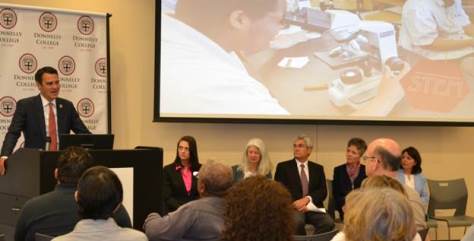Legislators await updated revenue projections but don’t expect them to erase deficit
by Andy Marso, KHI News Service
A group of Kansas economic experts will meet Monday to revise estimates of the state’s incoming tax revenue, removing the final reason legislators have cited to delay work on a tax and budget package that could end the 2015 session.
But what the package will look like is anybody’s guess, regardless of the new numbers.
The Consensus Revenue Estimating Group, which includes researchers from the executive branch, legislative branch and the state’s three largest universities, provides initial tax revenue estimates each year before the legislative session begins in January.
Lawmakers ideally use those numbers to form a tentative tax and budget plan during the regular session that runs from January through the end of March.
Then the revenue group meets again to update its numbers in April and lawmakers adjust their plan accordingly, if necessary, when they return for the “veto session” in late April or early May.
But this year the Legislature left Topeka with the budget unfinished and the tax plan barely started. The budget framework passed by the Senate creates about $667 million more in spending than the state is projected to receive in taxes in the fiscal year that begins in July.
Gov. Sam Brownback proposed a slowdown of scheduled income tax cuts and large increases in tobacco and alcohol taxes to make up the revenue shortfall. But legislators have been wary of the tax increases, and tax committee chairmen have decided not to vote on them until the new revenue estimates are complete.
The new estimates are unlikely to save the Legislature from having to make tough decisions. The state had good job growth numbers early in the year, but month-to-month tax collections for the current year still have fallen about $48 million short of estimates, which already were revised downward from earlier estimates.
The Legislature won’t return from break until April 29, but behind-the-scenes negotiations on how to fund state government and at what level likely will begin even before that.
Rep. Ron Highland, a Republican from Wamego who sits on the House Taxation Committee, doesn’t think the new numbers will alter the discussion.
“I don’t expect any huge change, which means there will be a deficit and how that’s handled is anybody’s guess right now,” Highland said. “Some think we ought to raise taxes. There’s a large group that says no.”
Highland said Brownback’s opposition to reversing the 2012 income tax cuts and a total tax exemption for “pass-through” business income provides tax negotiators with a place to start. Beyond that, he said, everything is on the table.
“You name anything, there have been talks about all these kinds of things: reducing exemptions, sales tax, looking at other things to tax,” he said.
Regardless of what the tax committee ultimately comes up with, Highland said it will be a difficult vote, with no guarantee of passage on the House floor if it gets out of committee.
“As soon as you talk about a new tax, the room fills up with people who want to protest it,” Highland said.
If conservative Republicans can’t get all their members on board with a tax increase, they would have to enlist help from moderate Republicans who did not support the 2012 tax plan — a tough sell because many of them have been targeted by primary opponents questioning their Republican bona fides.
The Republican supermajorities in the House and Senate likely will get little help from Democrats to get a tax plan passed if it does not include some rollback of the Brownback income tax cuts.
Democratic candidate for governor Paul Davis came within four percentage points of unseating Brownback in November largely on a message that the 2012 tax bill was ill-advised and would cause the sorts of deficits the state now faces. Democratic leaders have continued to tag the tax cuts as a “failed experiment” this session.
House Minority Leader Tom Burroughs, a Democrat from Kansas City, Kan., said any new revenue must come from tax increases that are stable enough to shore up the budget long-term and ensure that “everyone pays their fair share — individuals and corporations, rich and poor.”
“The tax increases under consideration right now do not meet these tests,” he said.
Burroughs predicted that the new revenue estimates probably would result in lower revenue projections, if there is any change at all. He said it was disappointing that the Legislature had waited until the 90-day session was nearly over to address the deficit.
Highland said he agreed with the decision to put off the tax votes until the April revenue numbers come in, but he doubts legislators will be able to come to an agreement by the 90th day of the session in mid-May.
He said he could not predict what sort of agreement could get a majority vote in the House and Senate and end the session.
“It’s a big unknown at this point,” Highland said.
The nonprofit KHI News Service is an editorially independent initiative of the Kansas Health Institute and a partner in the Heartland Health Monitor reporting collaboration. All stories and photos may be republished at no cost with proper attribution and a link back to KHI.org when a story is reposted online.
– See more at http://www.khi.org/news/article/final-barrier-to-tax-talks-soon-to-fall#sthash.OUtrJV7R.dpuf

